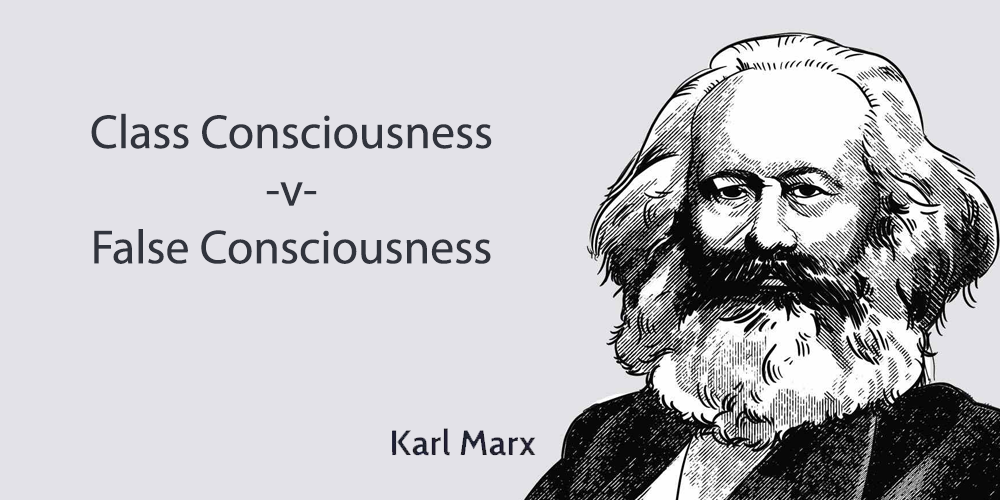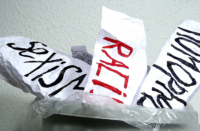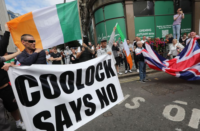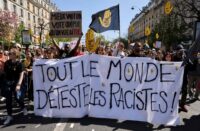The terms left and right originated following the French Revolution. In the French national assembly, the right comprised aristocrats and the rich. The left comprised the poor and working class who demanded democracy and wanted more tax on the rich.
Throughout history, the concept of left and right has changed, even from country to country. The term “far-left” appeared again in French public debate following the Bolshevik Revolution of 1917. Those who supported the revolution in Russia were labelled far-left, thus insinuating that anyone who partakes in revolution is extreme and a threat to the capitalist status quo.
What does the term “far-right” mean today in Ireland? Those who say they are on the left, right, and centre classify all those who oppose immigration as being far right. Being erroneously lumped together into a broad category and labelled “far-right”, this sweeping generalisation does not serve the interests of the working class. It only harms us.
We believe that socialists, communists, anarchists, and even nationalists should reject these neoliberal, disruptive terms which are insidiously misleading and weaponised. They are deliberately divisive and serve only the neoliberal ruling elite.
The EU’s migration policy is designed primarily to serve the interests of capitalist companies. While entry for skilled workers is easily accessible via visa procedure, the EU’s border regime criminalises those seeking asylum who are fleeing persecution, torture or war.
The EU’s immigration policy is a fascist policy but nobody, not even so-called socialist lawyers or concerned NGOs, have called the government far-right, fascist, extremist, racist, or criminal. While a toxic culture of calling out individuals has developed amongst the fake left against the working-class man or woman who uses a word they disapprove of, their silence about institutional racism and state violence is deafening.
The pervasive use of the term “far-right” in mainstream and social media and by the Free State government has now permeated normal vernacular. It is wrong because this term generalises a very wide range of people, mostly nationalist and working class people and communities, who have been abandoned and ignored by the state’s neoliberal government. It is imperative that we recognise that anti-government protests are not all far-right.
It is true, some fascist infiltrators whose origins are allegedly rooted in Europe and Britain are agitating behind the scenes. So far, they are successfully capitalising on working class communities’ legitimate frustrations, emboldened by the fake left’s obsession with bourgeois identity politics. Pitting working class people against each other is no accident. The rise of reactionary anti-fascist rallies is also no accident in the run up to Ireland’s general election which creates the perfect breeding ground for distraction away from the root cause of racism: institutional racism.
Firing the offensive term “far-right” at people in working class communities limits our ability to engage in dialogue in working class areas to create unity and collective resistance to the oppressive, barbaric neoliberal regime. Furthermore, such generalisations and confused mixtures make it impossible to distinguish between patriots and fascists.
A carefully nurtured antagonism has been created through the deliberate erasure of class consciousness. Class consciousness has been replaced by a culture war that has given birth to a fake left which includes left-liberal identity zealots: cool, anti-fash, radical, feminist, LGBTQ+, petty-bourgeois, white saviour, charity do-gooders. This fake left includes Green fascists, some anarchists and a small minority of socialist republicans, and communists.
There is zero point in debating the migration issue in terms of “far-right” and “far-left”. It is a pointless fight while we remain subordinate to the EU. First and foremost, we can and should demand a sovereign immigration policy. Both parties should reject the EU’s racist, exploitative criminal system. Secondly, if Ireland was sovereign we could apply our own migration policy: a more humane one, that would not contradict or antagonise the interests of the working class.
In reality there’s only one extremist position in Ireland’s political landscape: specifically, that of the neoliberal government parties Fine Gael, Fianna Fáil and the Green Party, for whom the law does not apply. In short, the far-right is not on the fringes, it is at the centre of political power.
To conclude, use of correct language and terminology is vital for class struggle. For serving the revolutionary struggle, being careful about the expressions we choose is crucially important. We must be vigilant of, and reject, the neoliberals’ devious attempts to divide us.






